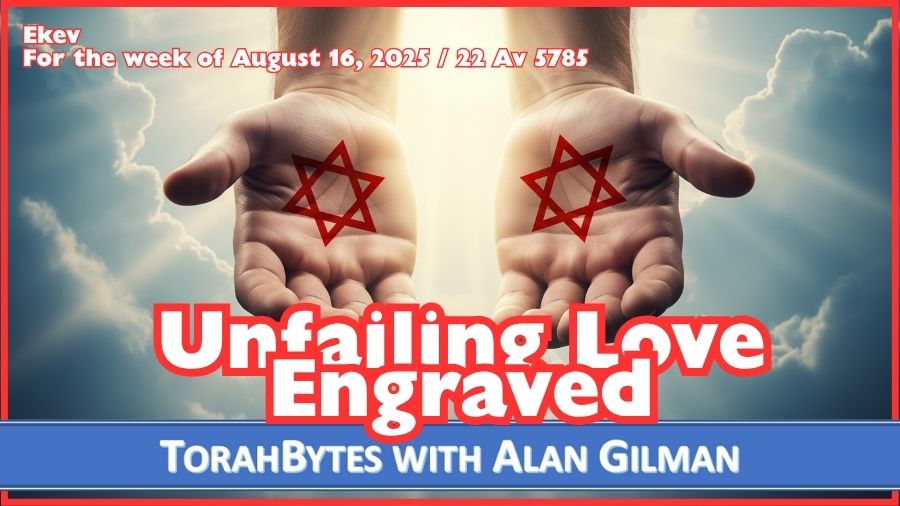For the week of August 16, 2025 / 22 Av 5785

Ekev
Torah: D’varim/Deuteronomy 7:12 – 11:25
Haftarah: Isaiah 49:14 – 51:3
Behold, I have engraved you on the palms of my hands; your walls are continually before me. (Isaiah 49:16)
A couple of weeks ago, I wrote about how troubled I was over the gross misunderstanding of the New Covenant Writings (the New Testament), in how it references Israel and the Jewish people. Historically, it has been assumed that God rejected the Jewish nation in response to their rejection of Yeshua. Further, antagonism on the part of some Jewish leaders toward the proclamation of the Messianic good news has been twisted into a general mischaracterization of all Jewish people for all time. These skewed views undermine the New Covenant Writings’ assertions of the key positive roles played by Jewish people and especially God’s unbreakable commitment to ethnic Israel.
Not only is the stereotype of the Jew as some eternal antichrist completely far-fetched, but the very essence of the New Covenant Writings is so very Jewish that it should make us wonder why non-Jews came to appreciate it at all.
I must admit, however, that a central, if not the central image of the New Testament, that of a crucified Messiah, is taken by most people, Jews or Gentiles, as anything but Jewish. This is mainly because the essence of what Yeshua came to do has been weaponized against the Jewish world from the early centuries of Church history. Yet, this is actually another case of vile misrepresentation of the Bible’s depiction of God’s relationship to the Jewish people.
This week’s Haftarah (weekly reading from the Hebrew Prophets) is the second of seven readings from Isaiah that follow the saddest day in the Jewish calendar, Tisha B’Av (the ninth day of the month Av), a day that commemorates the destruction of the first and second temples and many other disastrous events. These seven Isaiah passages were chosen to bring the people from mourning to hope.
No people group is as aware of their own historical failures and dismal consequences as my people, Israel. But thankfully, our sacred texts don’t just instill in us a sense of overwhelming failure, but are also a reminder of God’s love and faithfulness toward us. This week’s Haftarah includes these words:
“Can a woman forget her nursing child, that she should have no compassion on the son of her womb? Even these may forget, yet I will not forget you. Behold, I have engraved you on the palms of my hands; your walls are continually before me (Isaiah 49:15-16).
The day would come when the image of a crucified Messiah would be used to undermine the legitimacy of the Jewish people. But who was it that he died for? Jumping to a universal answer like “everyone” or personalizing as in “He died for me” may be appropriate, but often misses how God’s story of redemption unfolded. The Messiah came first and foremost for the people to whom he was promised. Israel was the only nation expecting a Messiah, a God-sent deliverer who would not only rescue them from their enemies, but would also restore the entire world.
The Jewish people’s not understanding that messianic deliverance necessitated Yeshua’s giving of his life for sin takes nothing away from his mission being primarily a Jewish one. For it is God’s unfailing love as first expressed to Abraham, Isaac, and Jacob, the fathers of ethnic Israel, that drives the scriptural narrative. It is Israel’s plight in particular that God determined to resolve through the Messiah, which set up the possibility for his blessing to come to the whole world. It is Israel whom God had engraved on the palms of his hands. It’s not a coincidence, therefore, that his love for them would be expressed through crucifixion.
Scriptures taken from the English Standard Version
Thank you brother Alan for your continued ministry through Torah Bytes. It’s always an interesting read and grounded in Scripture, for which I’m thankful.
Thank you for this reminder
I have experienced christians unfamiliar with each and all 66 books and Jews with a dependence on oral tradition who do not read even the prophets. Therefore, passages from Leviticus such as life is in the blood, God’s reason for the animal sacrificial system, God’s offering of Himself for redenption after the destruction of the temple, and any experience and understanding of the holiness and awesome love of God, is why the church is so void of the power and purposes of God and why the Jews do not own their awesome calling to share their light of faith with rhe world. If only Jews and Christians would read and ponder, breathe, eat, speak, live out, and believe every word of the Biblical texts, we would encounter the living God and His unfailing, poured out, suffering, sacrificial, pursuing, incredible love❤️ Oh to meet and have fellowship with Jew and gentile Bibie believers who have read, and reread, pondered, wrestled, and prayed through passages and the whole testament seeking God, we would surely have assemblies that grow continually in the very image of the God who wants to be known and loves us beyond our own understanding. He so yearns to be known! Look what He has done for us who seek Him day and night! ❤️